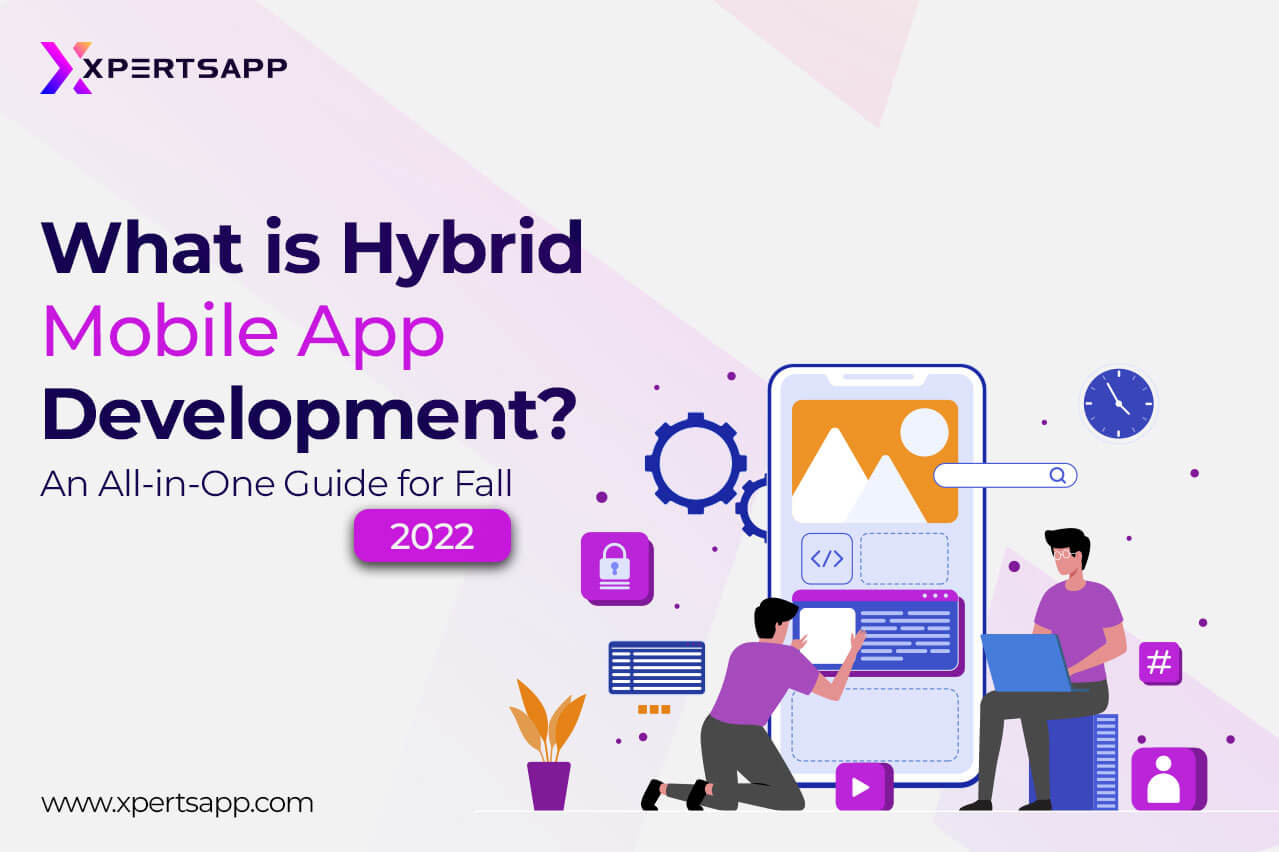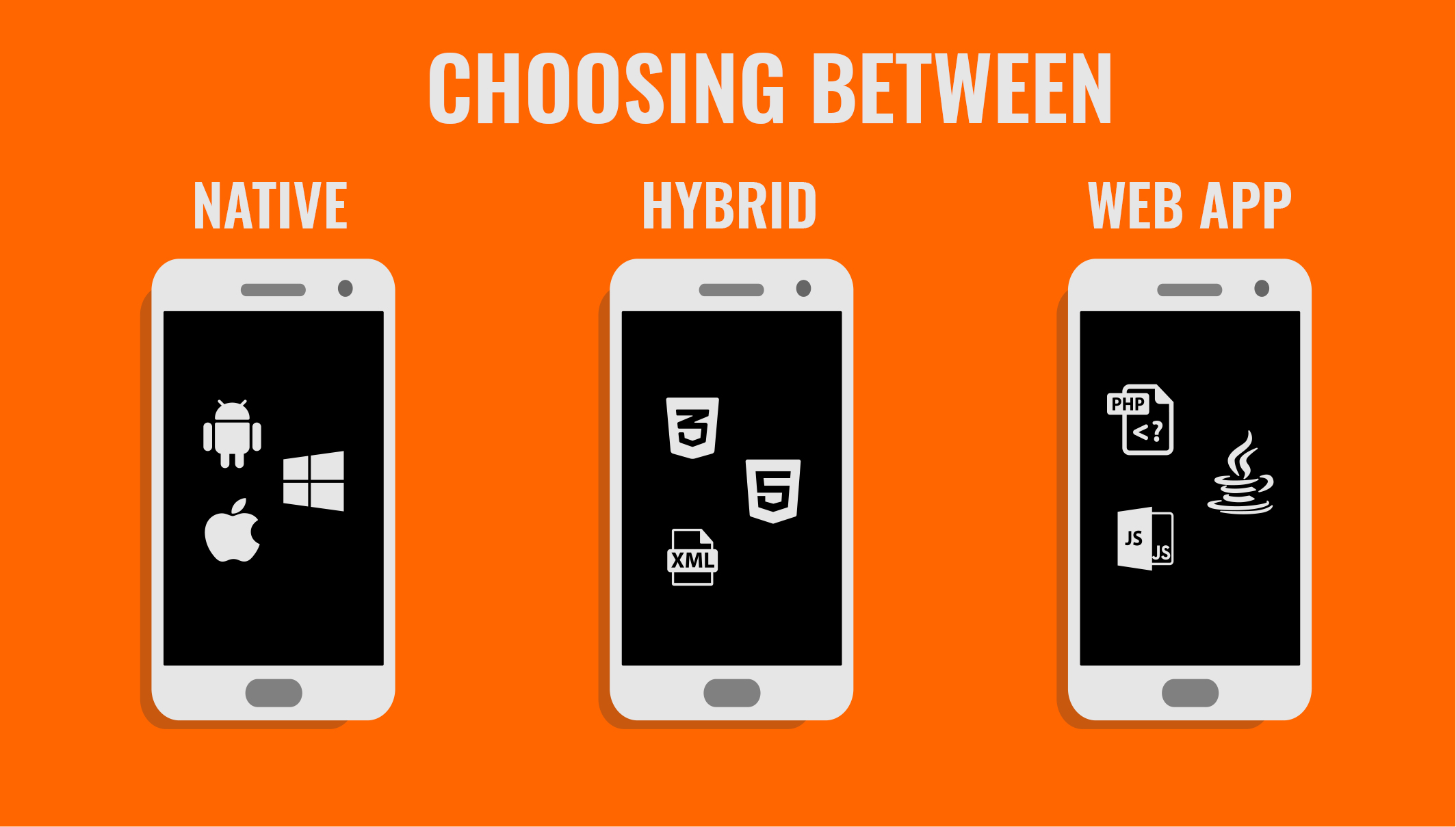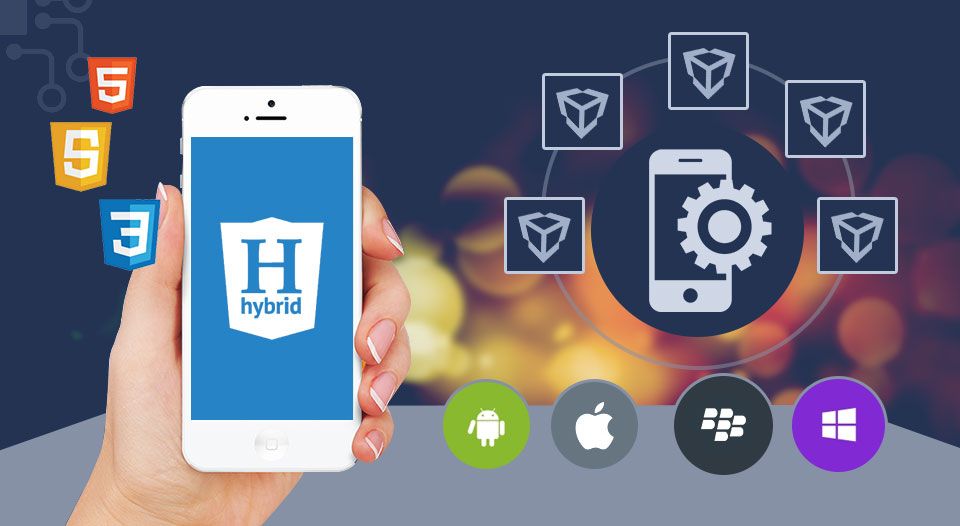What is Hybrid Mobile App Development? An All-in-One Guide for Fall 2022
by: XpertsApp Team
-7682 views

The world is full of technological wonders, and AI smatters. Among them are the magical mobile applications explicitly made to perform digital mojo through Artificial Intelligence and user interface. However, the usual question that crosses the brain of an app developer all while creating the App, first and foremost, is what type of application would blend in the charter of an ideal app? And in between, they are bound to pick one and sometimes more than one. Although there are three types of apps: Native, Hybrid, and Web, this guide will help you learn great insights and ideas on everything you need to know about Hybrid mobile app development in 2022.

What is Hybrid Mobile App Development?
Hybrid Mobile App Development is about striking the right blend of native mobile and web development technologies to sprinkle life into your App. Hybrid apps are created commonly using popular front-end development technologies and languages like JavaScript, HTML5, and CSS, giving them cross-platform functionality. Now that we know these apps can be installed on devices just like native apps, they are run entirely through web browsers.

Now that you have understood the basics of Hybrid Mobile App Development let us dig further into the cultural bindings of the App and get to know it more up-close and better.
Did you know that about 90% of the total time people spend on their phones is on apps? The usability of phones and convenient apps through it has seen a massive hike in 2022. With more than 3.5 billion users worldwide, the number of mobile apps, more importantly, hybrid mobile apps, will increase at a pace unlike anything else in the world.
How does Hybrid Mobile App Development work?
It is pretty clear by now, and as the name suggests, the hybrid mobile application is a smitter-smatter of native and web mobile development applications. It is processed by allowing the App to run through the embedded browser of each platform instead of the web browser itself, which means it can be installed on mobile devices and submitted to the app stores for sale just like any other regular native app.
Hybrid mobile app frameworks are quicker in programming apps, just like a traditional web app. They contain libraries of indigenous code, APIs, and other features that make coding fun, faster and easier. So, even if they are created out of web features, hybrid apps have the look and feel of native apps. It provides the same user experience and has the ability to work on different platforms.
Since native apps, both IOS and Android, are ideal because they’re individually optimized for each platform, it is evolving the hybrid mobile app technology and making it more viable, time and cost-efficient for mobile app development.
The evolution of technology and more and more mobile phone users escalated the trend of hybrid mobile application development. There are many reasons for it being popular in the app world.
Benefits of Hybrid Mobile App Development: A Win-Win App Type?
There are several stigmas attached to using hybrid application development. And by far, all have indicated towards positive. One of the many benefits of hybrid app development technology is that it mixes technologies to create an app, which gives you more flexibility and thousand better options to create something unusual yet beneficial out of it. What it tells you is that you are not limited to just one platform or technology, and that’s how it grows the list of options for tools to pick from.
Moreover, by developing hybrid mobile apps, you can reach more users because your App will work on multiple frameworks and devices. This feature will allow you to target those users who cannot withhold or are used to the current technological trends.
Additionally, it goes without saying that hybrid apps are typically faster, more reliant, and much more responsive than their counterpart, traditional web apps, providing a better, modern, and quicker user experience.
Now that it is said, here are the top most common and likable benefits of hybrid app development technologies:
Easy to Create
Besides bringing joy to the developer’s faces, hybrid apps are easier to develop than native apps because there is no need for a developer to know the language required by each platform. It’s just one code, one shift thing.
Performability
Hybrid mobile apps provide high speed and better performance, even faster than other responsive and progressive apps. They perform extraordinarily well than the usual mobile web apps running smoothly on operating systems with a high load of content or users. Facebook mobile application, for instance, is one of the examples of hybrid mobile apps that manage content production and massive traffic at it the same time.
Better User Experience
So far, we have covered the creation and Performa of a hybrid App; it is safe to say that it combines user experience with an agile development cycle. And in doing so paves the way for better designs, a more consistent user experience, and controlled costs.
Speedo and Cost-Effective
Developing a hybrid app takes significantly less time than developing a native app. This is because they use web components that are apparently better in speed and conveniently faster than native. This feature also enables cost-effectiveness and reduces the fraction of developing a traditional native app.
Top Clockwork Hybrid Mobile Apps
The numbers of successful hybrid Apps are many, but a few that stands out globally are the ones that you somehow have it on your phones or right under your fingertips, ready to be scrolled at any time.
So here are the best hybrid apps that live up to the performance of a multi-platform framework and prove that they can be just as great as a native app. They are:
- Gmail
- Airbnb
- Spotify
- Uber
Why Hybrid Apps are on the tip of the Iceberg of Every Tech Giants?
Tech companies around the world, with the likes of Google and meta, have successfully tested the hybrid app system and smashingly ran it in the tech world. However, we have gathered quite a few reasons why it has become the first choice of every company. For initials, hybrid apps have only one codebase. This factor makes its programming and debugging process relatively quick and simple.
Usually, hybrid apps take minimal time to develop optimally. With time reduction, you don’t need a larger group to work on developing apps. It automatically reduces costs, expenses, and resources and allows you to have quality people and work right under your nose in less budget and time consumption.
These are not the only reasons they choose a hybrid over any other app. There is more to it, and that has to do with source code. It prevents changes, and new versions of hybrid apps don’t need to wait for the app marketplaces’ permission. That’s big. You can also avoid a 7 to 14-day approval wait time and an approval fee.
5 Stages of Hybrid Mobile App Development
You might have heard of the famous five stages of grief. But this might not help you run your business in a longer race. For that, you will need a better guide to learn and develop a user-friendly hybrid mobile app.
We have jotted these five stages of hybrid mobile app development for you to inculcate the idea of creating the most satisfactory hybrid mobile App.
Let’s take a look at these multi-stages for developing a good sound Hybrid app or while searching for the best App Developer:
Pre-Development
Initials and Ideation (Blueprint) in this stage, you need to determine whether hybrid app development is what you are looking for in your project. It combines research and ideation, from picking up the right technology stack to choosing the same tools and frameworks. It covers them all.
Development
Creation and Coding is where you will be writing the Hybrid app development code. You will also require better platforms and tools like Xpertsapp to help build hybrid mobile apps. In this stage, you will prepare for user interface (UI)/user-experience (UX) and architectural and functionality development.
Post Development
Testing your hybrid app project thoroughly before giving it a green signal for production.
Deploying the hybrid mobile application to a specific platform or more than one platform so the end-users can easily access it. In this final stage, you will either have to submit your hybrid app development project on the Android/iOS app store, or you can host them on web servers by yourself.
Maintenance is a part of almost everything that happens to be a technology or borne out of it. However, hybrid app development is a continuous process. With time, you will need to make specific changes in your hybrid mobile application according to your business requirements or release new versions with better updates.
Bottom line
Multi-platform frameworks are the most popular system in the whole world. Besides, every other App people use these days are economically hybrid apps. Its popularity is so vague and reached the liking of big businesses and giants who have tested the technology and succeeded in running it in its prime of everything.
It clearly shows the immense capacity and potential of hybrid Mobile application type, yet it still manages to possess the power of running on different operating systems. One for all and all for one!
If you are someone out in the nature juggling with your business and looking to hire the best Hybrid Mobile App Developer, or if you are somebody seeking out the finest App Developing service, either way, you can reach out to us at Xpertsapp.